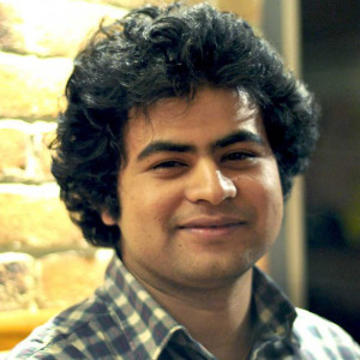Shrochis Karki, founder of Samaanta Foundation

Shrochis is the founder of Samaanta Foundation, an initiative that promotes equality and empowerment by providing quality higher education to students from poor socio-economic backgrounds in Nepal. Shrochis studied in the US and the UK, and received a DPhil in International Development from the University of Oxford.
When I was 10, I was selected to attend the national school of Nepal, and the opportunity had a massive effect on my life. Because of this, I was able to go to school in the US, which led on to my MPhil and DPhil in UK. I had no intention to start an organisation when I went out to Nepal to do my D. Phil. research, but when I found that numerous talented students were unable to pursue their higher education, I wanted to address these challenges. Samaanta is thus the action part of my D. Phil. research.
A lot of things we do, we try and frame them as being distinct or different. What we miss and forget is that we don’t have to always reinvent the wheel. I believe in taking small, reversible steps so that we continue to experiment as we expand, but limit our liabilities should some things not work.

To be honest, it was not necessarily a conscious plan to be an entrepreneur; I sort of accidentally fell into it. In Nepal, education up to tenth grade is mostly free, but many very smart kids don’t have the funds to continue after that. In the village where I was carrying out my research, talented students were considering quitting their education to leave Nepal to work in the Middle East as labourers. A group of us, who attended the same school and had been offered opportunities through the benevolence of others ourselves, started discussing ways to help those less fortunate than us. Between these discussions, and the evidence from my research that there are systemic barriers to education for the poor and the marginalised, the idea for Samaanta Foundation was born and developed. I had this theory that it was the lack of opportunity, and not the lack of ability, that was holding back students from rural communities.
However, it became obvious early on that throwing money at the problem would not be enough to address systemic education problems. We needed to set up structural support in a sustainable way to have impact, and our model of providing comprehensive, holistic education opportunities to meritorious needy students from public schools in rural communities in Nepal has proven highly successful so far.
Reflect a lot, as it is critical for everything you do. Build a team that both supports and challenges you. They say, “The road to hell is paved with good intentions”, so it is critical to build that both challenges and supports you. I am also a big believer in discourse – having discussions to flesh out ideas. And the ability to recognise that not everything will work. . .setbacks are part of the learning curve. Some bold ideas will inevitably fail, but this process can actually be beneficial to ensure that what happens next is successful.
In a country where the pass rate in higher secondary education is 40%, our fellows from public schools have a 100% pass rate. What I love more though is seeing the palpable transformation in our fellows. We take young fellows who are talented but do not have resources and are uncertain about their future. We then give them the kind of support that they need to blossom, and we see how quickly they adapt to new environments and realise their potential. There is a visible change, a transformation, which is amazing.
Same as above! A great example is a girl who for 6 months after she came to us, was struggling to say her name out loud. In less than 3 years’ time, she was presenting to an Australian delegation for us. Knowing where they have come from, it is so wonderful to see where they are now. Hopefully, our biggest successes are still to come. Our fellowship has a “pay it forward” component where each fellow must carry out service projects with their former schools and communities, and must share their experiences with other fellows. In our model, each family has to contribute something, anything, to ensure they have ownership over their children’s education. We have had some notable successes with our fellows so far, but the value of our fellowship will become clear only when they turn into responsible, contributing citizens.
So ideally we will have a community of fellows who give back to the foundation, and a community of families realising that value.
The biggest challenge is working with vulnerable people and communities. It is very personal, and not everyone reacts in the same way, no matter the opportunities. Our first year, our choices for the fellowships were reactionary, and we selected the most academically accomplished students. By the second year, we had developed a rigorous selection mechanism and expanded our selection base. We arranged paid internships for our fellows at one point, but found out that getting paid caused problems for some of the fellows and their families, as they became more focused on the work than their studies.
We are absolutely making some mistakes along the way, but we see them as opportunities to grow and learn ourselves, and we strive not to repeat them in the future.
I believe in taking small steps. We don’t have to think about changing the world; we can begin by thinking about changing the little things around us that we have control over. While it’s important to have a plan, we should realise that no plan actually works out perfectly, and that’s okay. If we stay grounded, and see where the activities take us rather than focus on preconceived notions, I think we can do some good things.
Share this
More news



